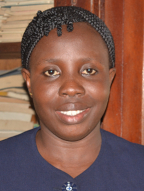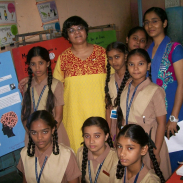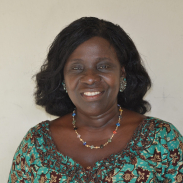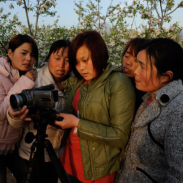International Project Grants
AAUW’s International Project Grants foster lasting impact by supporting International Fellowship alumnae who return to their home countries to lead community-based initiatives. These grants empower alumnae to apply their academic expertise and leadership skills to projects that advance gender equity and improve the lives of women and girls.
From securing property rights for widows to establishing safe and dignified workspaces for cassava producers, alumnae-led initiatives address urgent and deeply rooted equity challenges. By providing targeted funding, AAUW enables alumnae to drive meaningful, locally grounded change — supporting vulnerable yet resilient communities and creating pathways toward greater opportunity and empowerment for women and girls.
Award Details
Award Ceiling: $15,000
Grant Term: July 1 – June 30
Eligibility
International Project Grants are awarded exclusively to individuals who:
- Identify as a woman
- Are an AAUW International Fellowship alumna who has successfully completed the academic program for which they received a fellowship and all related reporting requirements by June 30th of the application year
- Applicants are expected to reside in and implement their project within their home country for the duration of the grant period.
- Exception for Displacement: Applicants who are residing outside their home country due to conflict, political instability, or humanitarian circumstances may be permitted to implement their project in their current country of residence. In such cases, applicants must demonstrate a meaningful connection to the host community and clearly articulate how the project addresses local needs.
- Be the primary project director, with control over all programmatic, budgetary, administrative, and editorial decisions
Citizenship & Immigration Status
Grant recipients must be non-U.S. citizens or permanent residents.
The following are not eligible for consideration:
- Members of the AAUW Board of Directors
- Employees of AAUW, including paid or unpaid, part-time or temporary employees, consultants, interns and contract employees
- Applicants who intend volunteer as Review Panelists for the year in which they are applying
- Immediate families (i.e., spouses and dependent children) of individuals described in the points above
- AAUW International Fellows who did not successfully complete the academic program for which they received a fellowship, and/or who did submit all required reporting in connection with their fellowship
Selection Criteria
- Clear alignment with AAUW’s mission of advancing equity for women and girls and should outline how the proposed project will directly and positively impact these stakeholder groups
- Project rationale that clearly defines a specific, locally relevant need and demonstrates the project’s timeliness, sustainability and significance and is supported by qualitative or quantitative evidence such as local data, community assessments or stakeholder feedback
- Clear project design with specific and measurable target outcomes, proposed activities, and a logical framework that clearly connects project goals, activities, and anticipated results
- Demonstrated capacity of the alumna to implement the project though relevant skills, experience, and leadership, supported by a realistic, time-bound implementation plan, a feasible budget, and evidence of stakeholder input in shaping both the timeline and resource allocation
- A commitment to learning and evaluation by (1) incorporating monitoring/evaluation methods that enable assessment of project outcomes; and (2) describing how results and/or learnings from project implementation will be shared with stakeholders and/or the communities which the project intends to serve
Applicants are required to submit a project proposal and supporting budget.
The required narrative project proposal includes the following components:
- Abstract
- Community Context & Need
- Project Description
- Leadership & Community Engagement
- Sustainability Plan
- Monitoring & Evaluation
An accurate, itemized budget for the proposed project is required, accompanied by a budget narrative.
Please note grant funds must be maintained in an account dedicated to project purposes.
Prohibited Costs
Please note grant funds cannot be used to:
- Fund salaries or stipends of the project director or other staff
- Influence legislation
- Influence the outcome of elections
- Carry out voter registration drives
- Finance fundraising activities
- Make grants to individuals or other organizations
- Pay for tuition or provide educational scholarships
- Renovate infrastructure or initiate building projects
FAQ
Is it possible to be notified of my award status prior to April 15th?
No. AAUW is not able to honor requests for earlier notification.
If I had to decline an AAUW award in the past due to eligibility concerns or personal reasons, am I allowed to reapply?
Yes. If you were awarded an AAUW fellowship or grant but had to decline it without receiving your stipend, you are eligible to reapply.
What if I do not live in my home country?
Applicants who are residing outside their home country due to conflict, political instability, or humanitarian circumstances may be permitted to implement their project in their current country of residence. In such cases, applicants must demonstrate a meaningful connection to the host community and clearly articulate how the project addresses local needs.
Can I apply if I am not an International Fellow Alumna?
No. This grant is reserved for individuals who have been awarded our International Fellowship and completed all grant requirements.
Do you provide funding for projects across all fields?
Yes. International Project Grants support all field as long as the project has an aim to advance gender equity for women and girls.
Does the project need to be new, or can it be an existing initiative?
Both new and existing initiatives are acceptable. Existing initiative must describe past activities and outcomes in the application and how this added funding will help build on the existing project.
Am I required to be involved in the project for the entire duration of the grant year, or can it be a shorter-term project (e.g., six months)?
You must be involved during the entirety of the project. If the project duration is shorter-term, explain the reasoning for the timeline in the application process.
Meet a Recent International Project Grantee
 Oluwatoyin Ayanlade’s research work has been on the application and management of information and communications technology (ICT) innovations in promoting inclusive and sustainable economic growth, both nationally and globally. In this project, she explores how ICT can be used to promote gender equality and empowerment when implemented. Her goal is to advance in her teaching and research career in a Nigerian university.
Oluwatoyin Ayanlade’s research work has been on the application and management of information and communications technology (ICT) innovations in promoting inclusive and sustainable economic growth, both nationally and globally. In this project, she explores how ICT can be used to promote gender equality and empowerment when implemented. Her goal is to advance in her teaching and research career in a Nigerian university.
Meet Our Alumnae

Melita Vaz
2016-17 International Project Grantee for her project “Enhancing Aspirations toward STEM Subjects in School Girls in M Ward, Mumbai, India.” The project created opportunities for girls in underprivileged communities in Mumbai, India, to learn about STEM and develop their resilience. She used her 2002–03 International Fellowship to earn a doctoral degree in social work.

Mary Dzansi-McPalm
2012-13 International Project Grantee for her project, Women Cooperatives in Cassava Business, Saviefe Agorkpo, Ghana.
She helped women and girls in Ghana learn to process and market cassava, the tuberous root of a tropical tree. She was a 2001-02 International Fellow.

Diedie Weng
2011-12 International Project Grantee for her project, “Yongji Organic Farmer Video Network Training Program, China.” She trained women farmers via video to document and discuss local techniques and challenges in organic agriculture in northern China. Weng has gone on to produce films, including “The Beekeeper and his Son,” her first feature documentary. She was a 2005–06 International Fellow.
